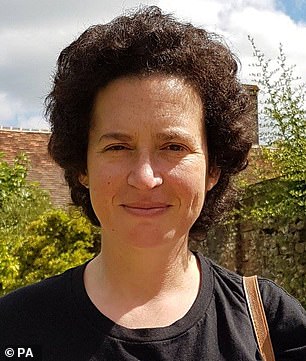A volunteer in Oxford University’s coronavirus vaccine trial has revealed she felt a ‘tiny sense of pride’ at taking part in research that could finally beat the virus.
Sarah Hurst, 47, from South Oxfordshire, said it was a ‘great feeling’ after hearing today that the vaccine could trigger an immune response in up to 90 per cent of those who receive the jab.
Jack Somers, 35, from London, who also took part, said he was ‘very happy’ and felt like his vaccine team had ‘just won’.
The pair, who both work as journalists, received two shots of either the experimental or placebo vaccine. Mr Somers said he suffered side-effects of a pain in his shoulder and slightly raised temperature, but Ms Somers said she didn’t experience any.
Scientists at Oxford University today revealed their vaccine triggers an immune response in up to 90 per cent of volunteers when the first shot is administered as a half dose – heralding a way to get the world back to normal.
Of the 20,000 people who got the jab, half received the vaccine. There were only 30 Covid-19 infections in this group, compared to 101 in the placebo, and none of them experienced a severe reaction.
Politicians and experts congratulated the Oxford team on their breakthrough today, after their vaccine bolstered global armaments against the virus.
A second volunteer in the trials previously told MailOnline they had suffered a fever, headaches, chills and fatigue 14 hours after getting their first shot.
Brazilian doctor João Pedro R. Feitosa, 28, died from Covid-19 during the trials after receiving a placebo. He had been working in emergency wards and intensive care treating infected patients since March at two hospitals in Rio de Janeiro.

Sarah Hurst, 47, from Goring-on-Thames and Jack Somers, 35, took part in the trials. Ms Hurst said it gave her a ‘tiny sense of pride’ to have been a volunteer in the trials

Oxford’s Covid-19 vaccine was revealed to be up to 90 per cent effective today (stock image)
Ms Hurst, who works as a journalist, said: ‘It’s really the developers and everyone who’s done all the work, all the medical students who are constantly all day meeting the vaccine participants and testing them and being on the front line.
‘But it’s good, it’s a great feeling to help to make a vaccine.’
Explaining why she signed up, she said: ‘I live near where it’s being done and they were looking for people in the Thames Valley. As soon as I saw that I wanted to get involved to help research a vaccine.’
She underwent health checks and blood tests before receiving her two shots, and filled in a diary to notify researchers of her movements over the course of the study, as well as any symptoms.
‘You have to treat it as if you were in the placebo group anyway, you wouldn’t go out and randomly expose yourself because you don’t know,’ she said.
Despite suffering no side effects, this doesn’t mean she received the placebo. The trial used the meningitis vaccine as a control, which scientists argued would elicit a similar response to the Covid-19 jab.
She said today’s results were ‘promising’ and noted ‘the fact it doesn’t need to be chilled at a very low temperature and is cheaper than the other vaccines will help in making it easier to distribute’.
‘You have to treat it as if you were in the placebo group anyway, you wouldn’t go out and randomly expose yourself because you don’t know,’ she said.
‘People have only been vaccinated for a few months so I would still want to know: what are going to be the results after a year? Is it going to be effective after a year?
‘That’s something you really just have to wait for.’
Mr Somers, who also took part in the trials, said he found it hard to believe how quickly scientists had developed the vaccine.
‘I can’t help but take my hat off to the scientists,’ said the freelance journalist from south-west London.
‘I remember six months ago sitting in a hospital watching a safety video, with Professor Matthew Snape at Oxford University talking in quite careful, deliberate, cautious terms about how this vaccine might work or it might not work.
‘Now it seems amazing that we’re here six months later and that jab is very effective at stopping coronavirus.
‘It’s not where I thought we’d be six months ago, it’s not even where I thought we’d be a month ago, but it’s testament to the work of so many people, so many extraordinary people.’


Oxford professors Sarah Gilbert and Andrew Pollard have both worked to create the vaccine that could beat the virus and bring the world back to normal
Volunteers receive no information about how the trial is going so have been following the progress in the media along with everybody else.
And Mr Sommers said that, while he had been very pleased to read about positive results from other vaccines such as that developed by Pfizer, there was a special feeling about this one.
‘It does feel a bit like I was supporting a team and it was good to watch other teams win and score, but now my team has won and I’m very happy about that,’ he said.
The UK has secured 100million doses of Oxford’s vaccine, with 4million set to be delivered before the end of this year. But they will need to be approved by regulators before they can be distributed.
